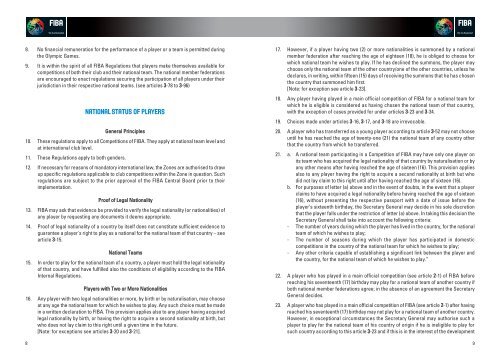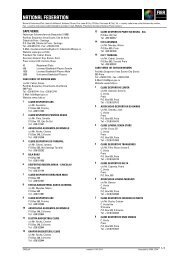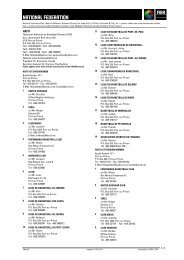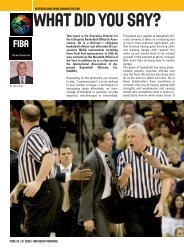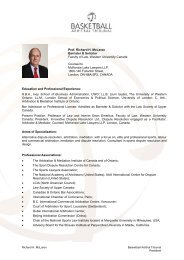Book 3 - Fiba
Book 3 - Fiba
Book 3 - Fiba
Create successful ePaper yourself
Turn your PDF publications into a flip-book with our unique Google optimized e-Paper software.
8. No financial remuneration for the performance of a player or a team is permitted during<br />
the Olympic Games.<br />
9. It is within the spirit of all FIBA Regulations that players make themselves available for<br />
competitions of both their club and their national team. The national member federations<br />
are encouraged to enact regulations securing the participation of all players under their<br />
jurisdiction in their respective national teams. (see articles 3-78 to 3-96)<br />
National Status of Players<br />
General Principles<br />
10. These regulations apply to all Competitions of FIBA. They apply at national team level and<br />
at international club level.<br />
11. These Regulations apply to both genders.<br />
12. If necessary for reasons of mandatory international law, the Zones are authorised to draw<br />
up specific regulations applicable to club competitions within the Zone in question. Such<br />
regulations are subject to the prior approval of the FIBA Central Board prior to their<br />
implementation.<br />
Proof of Legal Nationality<br />
13. FIBA may ask that evidence be provided to verify the legal nationality (or nationalities) of<br />
any player by requesting any documents it deems appropriate.<br />
14. Proof of legal nationality of a country by itself does not constitute sufficient evidence to<br />
guarantee a player's right to play as a national for the national team of that country – see<br />
article 3-15.<br />
National Teams<br />
15. In order to play for the national team of a country, a player must hold the legal nationality<br />
of that country, and have fulfilled also the conditions of eligibility according to the FIBA<br />
Internal Regulations.<br />
Players with Two or More Nationalities<br />
16. Any player with two legal nationalities or more, by birth or by naturalisation, may choose<br />
at any age the national team for which he wishes to play. Any such choice must be made<br />
in a written declaration to FIBA. This provision applies also to any player having acquired<br />
legal nationality by birth, or having the right to acquire a second nationality at birth, but<br />
who does not lay claim to this right until a given time in the future.<br />
[Note: for exceptions see articles 3-20 and 3-21].<br />
8<br />
17. However, if a player having two (2) or more nationalities is summoned by a national<br />
member federation after reaching the age of eighteen (18), he is obliged to choose for<br />
which national team he wishes to play. If he has declined the summons, the player may<br />
choose only the national team of the other country/one of the other countries, unless he<br />
declares, in writing, within fifteen (15) days of receiving the summons that he has chosen<br />
the country that summoned him first.<br />
[Note: for exception see article 3-23].<br />
18. Any player having played in a main official competition of FIBA for a national team for<br />
which he is eligible is considered as having chosen the national team of that country,<br />
with the exception of cases provided for under articles 3-23 and 3-34.<br />
19. Choices made under articles 3-16, 3-17, and 3-18 are irrevocable.<br />
20. A player who has transferred as a young player according to article 3-52 may not choose<br />
until he has reached the age of twenty-one (21) the national team of any country other<br />
that the country from which he transferred.<br />
21. a. A national team participating in a Competition of FIBA may have only one player on<br />
its team who has acquired the legal nationality of that country by naturalisation or by<br />
any other means after having reached the age of sixteen (16). This provision applies<br />
also to any player having the right to acquire a second nationality at birth but who<br />
did not lay claim to this right until after having reached the age of sixteen (16).<br />
b. For purposes of letter (a) above and in the event of doubts, in the event that a player<br />
claims to have acquired a legal nationality before having reached the age of sixteen<br />
(16), without presenting the respective passport with a date of issue before the<br />
player’s sixteenth birthday, the Secretary General may decide in his sole discretion<br />
that the player falls under the restriction of letter (a) above. In taking this decision the<br />
Secretary General shall take into account the following criteria:<br />
- The number of years during which the player has lived in the country, for the national<br />
team of which he wishes to play;<br />
- The number of seasons during which the player has participated in domestic<br />
competitions in the country of the national team for which he wishes to play;<br />
- Any other criteria capable of establishing a significant link between the player and<br />
the country, for the national team of which he wishes to play.”<br />
22. A player who has played in a main official competition (see article 2-1) of FIBA before<br />
reaching his seventeenth (17) birthday may play for a national team of another country if<br />
both national member federations agree; in the absence of an agreement the Secretary<br />
General decides.<br />
23. A player who has played in a main official competition of FIBA (see article 2-1) after having<br />
reached his seventeenth (17) birthday may not play for a national team of another country.<br />
However, in exceptional circumstances the Secretary General may authorise such a<br />
player to play for the national team of his country of origin if he is ineligible to play for<br />
such country according to this article 3-23 and if this is in the interest of the development<br />
9


